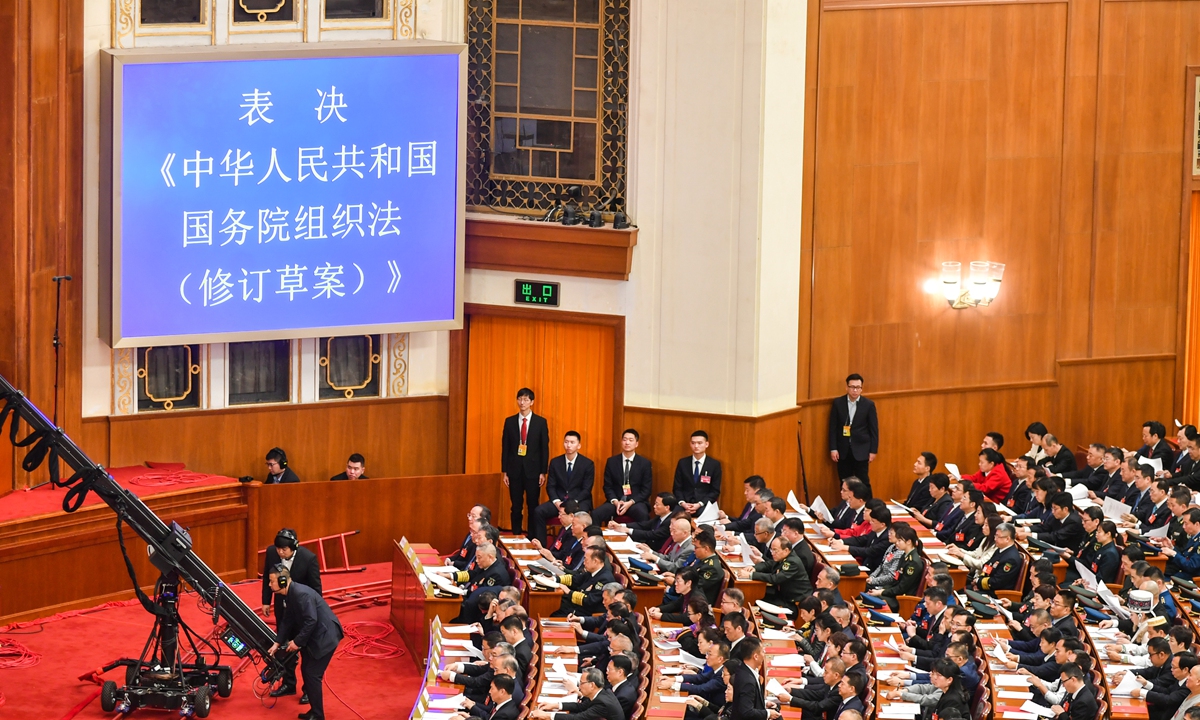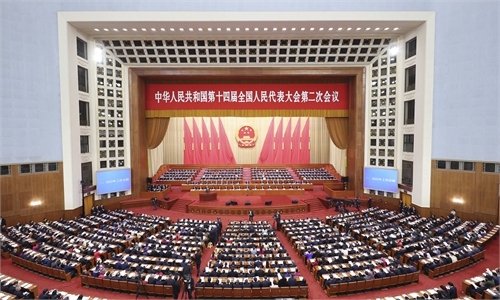Revised Organic Law of the State Council passed
Emendation ensures smooth implementation of important policy decision: expert

Chinese national lawmakers pass a revised Organic Law of the State Council at the closing meeting of the second session of the 14th National People's Congress on March 11, 2024. Photo: VCG
Chinese President Xi Jinping signed a presidential order on Monday to promulgate a revised Organic Law of the State Council, which took effect on the same day.
The revisions to the law were passed by Chinese national lawmakers on Monday at the closing meeting of the second session of the 14th National People's Congress (NPC), the first revision of the law since its adoption in 1982, the Xinhua News Agency reported.
The revised Organic Law of the State Council meets the development requirements of the times, scholars told the Global Times. The revision emphasizes the leadership of the Party over administrative organs, and will help ensure smooth governance and the implementation of important decisions.
The latest revision contains 20 articles, and adds provisions concerning the nature and position of the State Council per the Constitution, which stipulates that the State Council, namely, the central government, is the executive organ of the highest state organ of power, and is the highest state administrative organ. It also refines the expressions regarding the functions and powers of the State Council and adds a provision that the State Council exercises unified leadership over the work of local state administrative organs at all levels nationwide, according to Xinhua.
According to the revision, the amended provisions further clarify the duties of vice premiers and state councilors. It adds the governor of the People's Bank of China as a member of the State Council.
The lawmakers started deliberating the draft revision to the Organic Law of the State Council on March 5. On Sunday, the third meeting of the presidium of the second session of the 14th NPC made a decision to submit the draft revision to the NPC session for a vote.
The law has played a significant role in ensuring that the State Council performs its duties in accordance with the Constitution and other laws, said Li Hongzhong, vice chairman of the NPC Standing Committee, when explaining the bill at the opening meeting of the second session of the 14th NPC, according to the Xinhua News Agency.
Revising the law is a necessary step for the State Council to uphold the Party's overall leadership and strengthen the all-round improvement of governance, said Li, adding that it provides an institutional guarantee for the State Council to adhere to its people-centered principle and its fundamental purpose of wholeheartedly serving the people, a Xinhua said on March 6.
The revision is also an important part of efforts to fully implement and enforce the Constitution and establish law-based governance, as well as being an effective measure to reform Party and state institutions and modernize the country's systems and capacity for governance, according to Li.
The revised Organic Law of the State Council highlights its political nature, putting even more emphasis on the unified leadership of the Party over state administrative organs, Zhuang Deshui, deputy director of the Research Center for Government Integrity-Building at Peking University, told the Global Times on Monday.
This is a significant change aimed at ensuring smooth implementation of the policies, or in other word, the important policy deployment of the CPC Central Committee can be carried out through the state administrative organs, said the expert.
"At the same time, it modified the decision-making mechanism of the State Council, especially by incorporating central bank into the State Council, which increased the country's decision-making power," Zhuang told the Global Times. "It allows heads of more of the departments related to major national decisions to enter the decision-making body, which is beneficial for ensuring the implementation of decisions."
The Organic Law of the State Council was adopted in December 1982 when China's current Constitution was formulated and had never gone through a revision before today.
The revision of such an important and long-standing law adapts to the requirements of the times, and better suits the functions of the current State Council, Zhuang noted.
"It is a result of our practice over the past few decades, and responds to the practical needs of the operation of the State Council," he said, noting that the outcome will be clearer to see after a few years of implementation.
After deliberation began on the draft revision, it drew widespread attention from foreign media. Many of them misinterpreted it, smearing it as signifying further centralization of power or weakening of government authority. Observers pointed out that these misunderstandings stem from a fundamental prejudice by many Westerners against China's unique system.
The idea of separation of the Party and government in China has always meant that specific functions of the Party and the government should be separated, not that the government should be detached from the Party's leadership, Zhuang explained.
"The goal was always to improve the Party's leadership mechanism and methods in order to better lead the government's work," he said. "The Party is responsible for overall coordination and decision-making, with a division of labor and coordination between the Party and government. The central government will not be marginalized."

